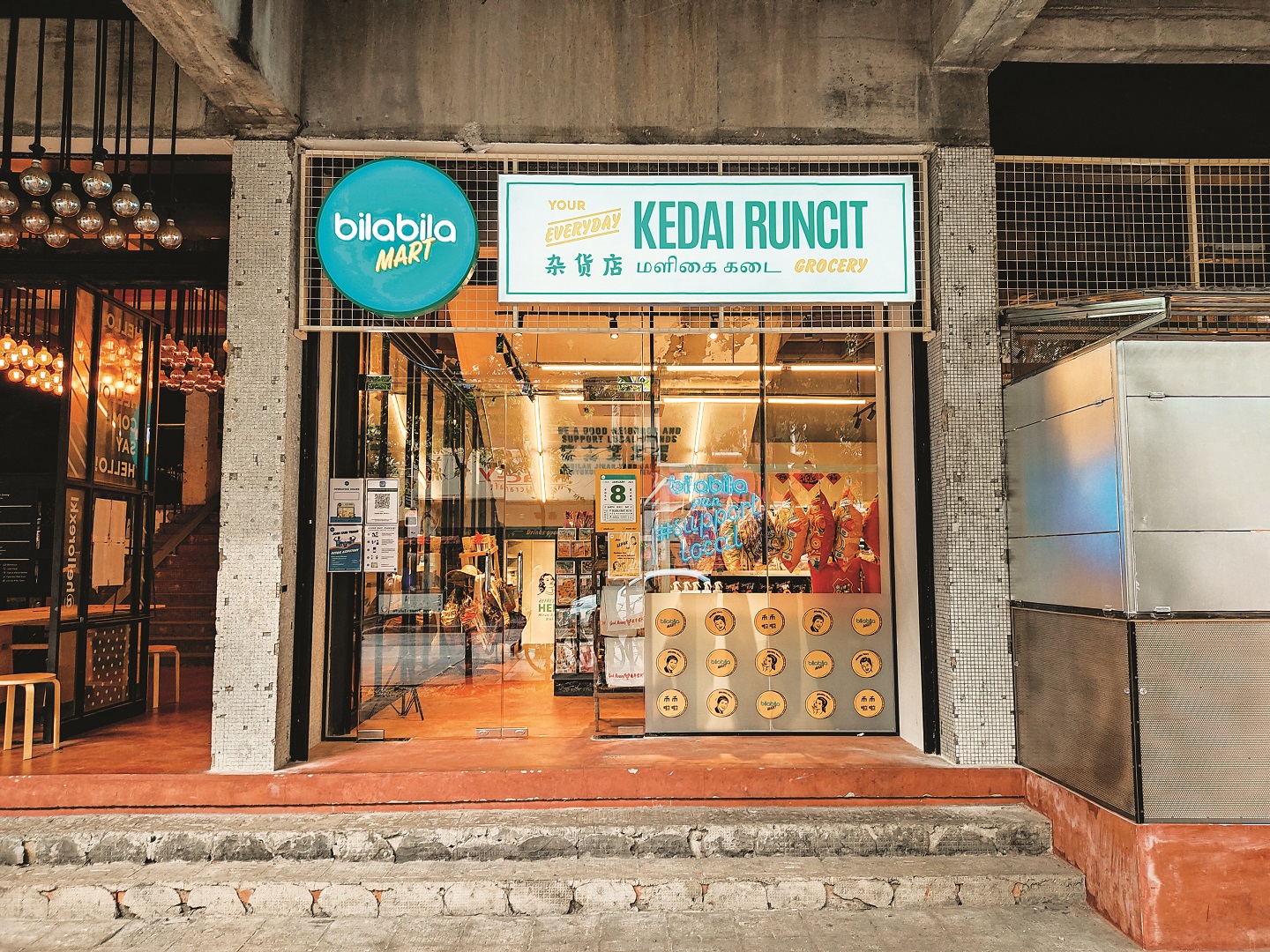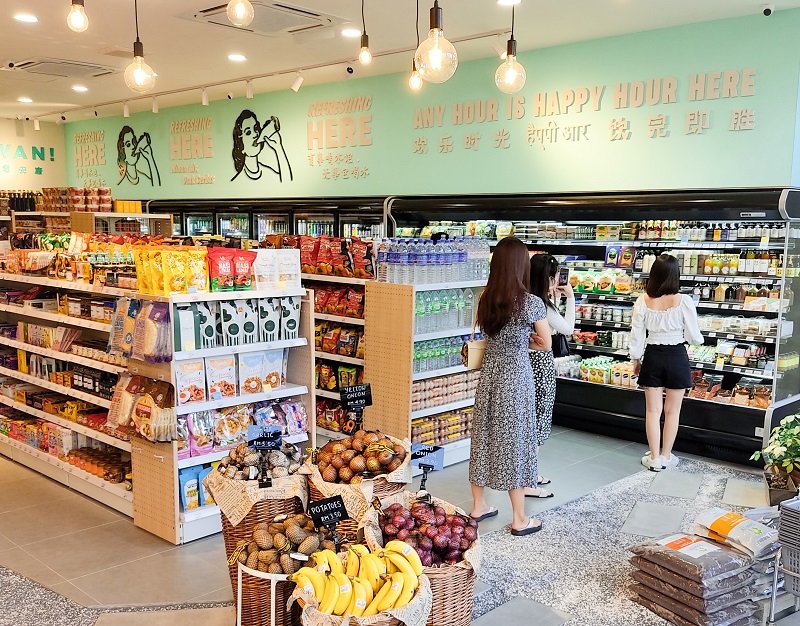
The nostalgia of a kedai runcit with the sensibilities of a modern
konbini (Photo: Bilabila Mart)
After the Japanese konbini craze hit Malaysia with the arrival of FamilyMart, the lot of us — especially in the Klang Valley — now consider the concept of shopping at a convenience store a little differently. Our standards are higher, we look for more outstanding products on the shelves and, essentially, a more satisfying encounter when we nip into a minimart looking for bread, milk and eggs. Enter BilaBila Mart, which aims to elevate the humble kedai runcit experience with a modern twist that is wholly Malaysian.
BilaBila Mart was co-founded by Lee Hui Jing and two others, all old friends who were eager to establish a convenience store that championed local brands, much like what FamilyMart and emart24 do for Japanese and Korean products, respectively.
“We’ve always been fans of local brands selling on Instagram and wanted to make it more affordable for people to get their products on the shelves of convenience stores,” Lee says. “But we soon realised the barriers to entry were too high for many of these brands because of the listing fee they have to pay to get on the shelves of major convenience stores. Our solution was quite simple — get rid of the listing fee, and instead, work on a profit-sharing system with these brands so both parties stand to benefit.”
We are seated at the coffee bar in BilaBila Mart’s Nidoz Residences outlet in Desa Sri Petaling, Kuala Lumpur, where a shelf next to us is stocked with a healthy serving of retro snacks like Haw Flakes, kacang tumbuk (crushed roasted peanuts), Gold Coin chocolate and nearby, biscuits sold by weight from old-fashioned tins. Elsewhere on the shelves, expect to find local brands peddling everything from chilli paste to chips, and in the chillers, Chinese herbal drinks, kombucha and cold-brew coffee. A jaunt to a BilaBila Mart is a trip through Malaysia’s food entrepreneurial scene, and we dare you to leave without filling your basket — we couldn’t resist the temptation, certainly.
20220708_peo_bilabila_retail_sdn_bhd_co_founder_jing_pg-8.jpg

“Depending on the location, we don’t just operate as a tuck shop, but also sell fresh fruit and vegetables — like a proper old-fashioned kedai runcit would,” Lee shares. “It’s an experience we all remember from our childhood, isn’t it? A neighbourhood store that really did sell all sorts of knick-knacks and served the needs of the community perfectly well. Those kedai runcit have lost out with the convenience of hypermarkets and larger supermarkets, but with BilaBila Mart, we wanted to rekindle the nostalgia of the kedai runcit … only naturally, in a more sustainable and sensible way that better caters to modern needs.”
BilaBila Mart opened two days before the pandemic and spent its early days selling masks and sanitisers via WhatsApp to customers who spotted the items on the shelves through Lee’s Instagram posts — at the time, these products were in short supply, and she found herself shipping them to buyers from as far afield as Perlis. It was an unfortunate time to start a grocery business, but the team persevered and, as restrictions loosened, it was able to grow its inventory and expand the number of stores. Up to 70% of the products on BilaBila Mart’s shelves are local, and there are now 18 outlets in the Klang Valley.
Lee and her team are passionate foodies, and wanted to do away with the perception that Malaysian-made food and drinks are of low quality. They scoured the local food scene in search of brands to stock across multiple product categories. They do not specify that the brands sell exclusively to them, as the idea is also to help these small producers expand their business.
“In terms of the product mix, we don’t stock anything that we ourselves don’t absolutely love,” Lee says. “Everything sold in the store is taste-tested by us first; we would never sell anything we don’t enjoy. We also look at product details like packaging, nutritional information and HACCP [Hazard Analysis Critical Control Point] certification, which means that it meets food safety standards. We are not just championing local brands, but also those with a real commitment to excellence and quality.”
Today, BilaBila Mart outlets are most commonly found in condominiums and residential areas with a few in more expat- and tourist-centric zones like Mont’Kiara and downtown KL.
1644807464562.jpg

“At first, it was tough entering the condo scene. We had to really negotiate with the JMBs [joint management bodies]. What they liked was our locally-driven product range,” Lee reveals. “We look at issues like natural footfall and who the residents of a given development are, and if there are other convenience stores in the area that we would be competing with.”
BilaBila Mart counts property developer Exsim Group as an investor, and therefore, the “convenience grocer” will be a standard feature in all its residential projects. Lee and her team had actually approached Exsim to open up in one of its condominium developments, and that was how the business relationship started.
In two years, the team grew from just the three founders to 90-people strong — this is commendable indeed, especially since much of its growth was during the two years of the pandemic. Lee also credits the company’s success to the support of her team.
“I think our stock-in-trade is that we sell fresh produce and dry groceries together, as most other minimarts only sell the latter. We found a sweet spot between convenience store and grocer, so we call ourselves ‘convenience grocer’, and this model has proven to be quite successful. At this point, we are a profitable business,” Lee says.
The team’s five-year plan includes several more stores across the Klang Valley, and in two years, in Penang as well. Its growth strategy will also take into account its investors’ expansion plans nationwide.
“We are still not in Cheras, Bandar Utama and many more suburbs in the Klang Valley, so that is our immediate priority. We don’t have direct competitors right now, so I’d say the challenge that we face is this: continually growing our inventory, getting more people into our stores and educating consumers on the curated nature of our products.”
This article first appeared on Aug 15, 2022 in The Edge Malaysia.


